It remains one of the biggest talking points of today, but Queensland’s native title debate clearly isn’t going anywhere.
For decades it has divided many across the state, sparking battles in courtrooms and in backyards.
These are the winding tales of native title claims and battles, as told at the time, across the past four decades.
October 1986
A historic land rights trial started in the Supreme Court in Brisbane as a group of Torres Strait Islanders took on the Queensland Government.
The islanders claimed they had lived on several islands since time immemorial and are owners by custom.
The Queensland Government annexed the islands 107 years earlier.
A legal team led by prominent Queen’s Counsel Mr Ron Castan flew to Brisbane from Victoria to lead the case for the islanders.
Eddie Mabo and three other elders of Murray Island sought a Supreme Court order declaring that they are the owners by custom and the holders of traditional native title to Murray, Dawar and Waier islands.
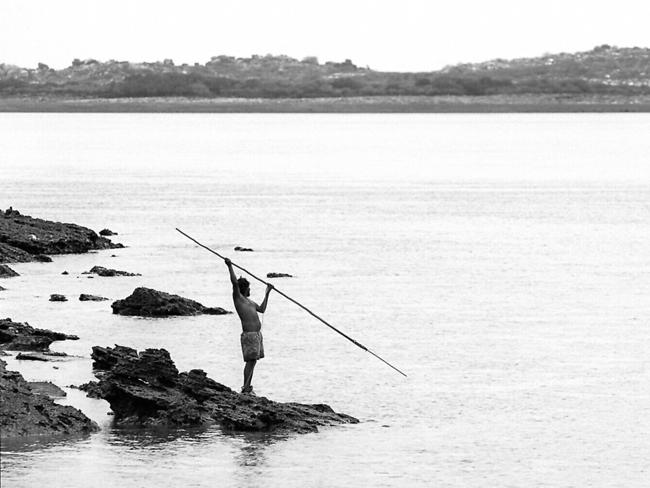
May 1988
The North Stradbroke Island Noonuccal tribe issued a High Court writ claiming sovereignty over, title to and possession of Stradbroke Island.
The defendants were the Queensland and Federal Governments and the United Kingdom Attorney-General.
Mr Dennis Walker, the son of poet Oodgeroo Noonuccal (formerly Kath Walker), was the Noonuccal people’s representative.
Mr Walker said in a statement this was the first time the action of Captain James Cook in purporting to take possession of the east coast of Australia had been questioned.
Claims in the writ included that Stradbroke Island was not part of the islands and land over which the UK took possession.
March 1993
Only 22 per cent of Australians believe Indigenous Australians should receive compensation for being dispossessed of their land by European settlement.
The two states most opposed to the concept were those with the proportionally biggest populations, Queensland and Western Australia.
Only 14 per cent of Queenslanders and 11 per cent of Western Australians believed Indigenous Australians should be compensated.
The rate of approval for compensation is almost double in New South Wales (25 per cent) and Victoria (27 per cent).
The Morgan Gallup poll findings had significant ramifications as the Keating Government prepared to clarify the High Court’s landmark Mabo decision from 1992.
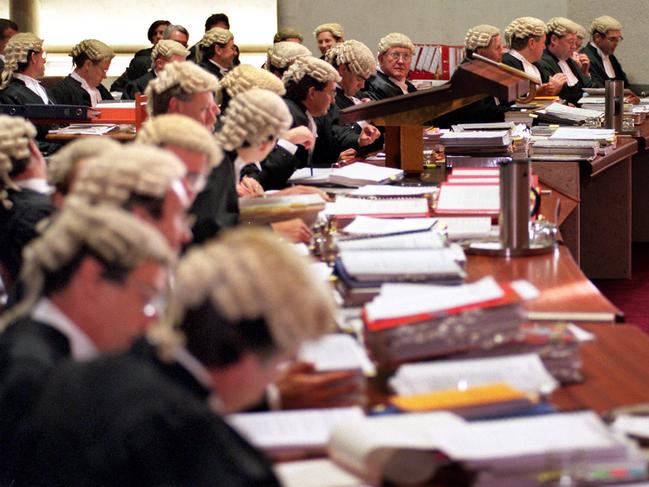
July 1993
An Indigenous tribe claimed native title over Cairns’s historic Anzac Park.
The Yirrganydji tribe wrote to Premier Wayne Goss demanding recognition of its rights under 1992’s Mabo decision in the High Court.
In a prepared statement, the tribe said it wanted to “avoid conflict, but were prepared to go to the courts if they had to’’.
A spokeswoman for the tribe, Jeanette Singleton, said all the Aboriginal tribes in the Cairns area had always used Anzac Park as a meeting place.
February 1994
An Indigenous tribe filed a native-title claim on Fraser Island.
The Dalungbara, Batchala and Ngulungbara People of Kgari (the Great Sandy region) filed a writ in the Supreme Court in Brisbane seeking native title for Crown land including heritage-listed Fraser Island.
Fraser Island Land Council spokesman John Lee Jones – who lodged the writ – said descendants of two Queensland trackers involved in the hunt for bushranger Ned Kelly would
lodge another writ against Victoria’s Treasury Department.
That writ would seek payment of a Pounds Sterling 50 reward for their role in Kelly’s capture in 1880: a reward Mr Jones said had not been paid.
He said descendants estimated that, with interest, the reward would be worth more than $3 million, money they planned to use to improve health, education and sporting resources for Indigenous Australians.
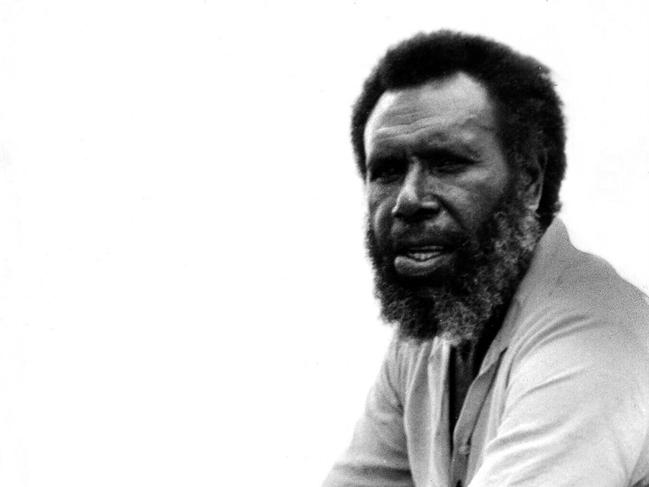
February 1995
Extensive Queensland grazing and mining land appears was freed from future native title claims following a judge’s decision.
Lawyers and mining and grazing sector representatives described as a landmark the decision upholding the validity of pastoral leases.
In a decision handed down, National Native Title Tribunal president Justice Robert French rejected a native title claim from the Waanyi people over land including part of CRA Ltd’s rich Century zinc deposit.
He found a pastoral lease granted in 1883 over the northwest Queensland land extinguished native title.
February 1996
Traditional owners at Hope Vale, north of Cooktown, signed an agreement to recognise each other’s native title rights in a bid to end violent community infighting.
The agreement, brokered by The Cape York Land Council, committed the clans to bring a native claim together over the Hope Vale area but preserved each clan’s native title rights in their traditional estate.
It also provided dispute-resolution mechanisms to settle disagreements over land issues and permits historical Indigenous residents of Hope Vale to camp, hunt and fish on the clan estates.
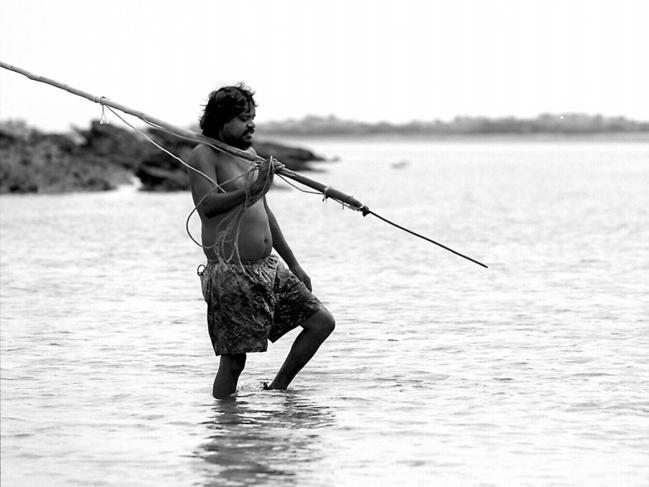
April 1996
Growing resentment against native title claims could affect services to Indigenous people, Queensland Premier Rob Borbidge said.
He said a native title claim over land on which a gas pipeline was being built could threaten gas supplies to southeast Queensland.
Mr Borbidge said the claim, by the Gunggari people, was “mischievous’’, “without justification’’ and would threaten gas supplies if the project did not go ahead.
He said the backlash was making it hard for the Government to devote resources to the Aboriginal community.
“It just gets people’s backs up, and the people affected and the people that they know are affected become very angry, and rightly so,’’ Mr Borbidge said.
January 1997
Premier Rob Borbidge promised compensation would be paid to Indigenous Australians who lost native title rights through proposed law changes thrashed out in high-level meetings in Darwin and Perth.
After two days seeking a unified Wik solution with Northern Territory Chief Minister Shane Stone and West Australian Premier Richard Court, Mr Borbidge said while common ground was found between the three states most affected by the High Court’s Wik decision, difficulties had emerged due to variations in the states’ systems of land tenure.
Mr Borbidge confirmed the states were seriously considering pushing the Howard Government to include a sunset clause in amended laws, forcing all native title claims to be lodged within a set time frame, such as 12 months.
September 1997
Forty per cent of Queensland was subject to native title claim after a rush of applications by Aboriginal groups attempting to beat the Howard Government’s Native Title Amendment Bill.
The rush prompted one Indigenous leader to warn that Indigenous people were being “spooked’’ by the looming amendments.
The lodgement of a claim does not automatically award native title or access to the land.
Many of the recent claims were criticised as vexatious and faced rejection under the so-called Wik 10-point plan.
Under the proposed Wik amendments, Indigenous Australians would be required to prove a traditional physical association with the land they are claiming.
Aboriginal and Torres Strait Island Commission deputy chair Ray Robinson said Indigenous people were worried about losing their rights and the recent claims reflected their uncertainty.
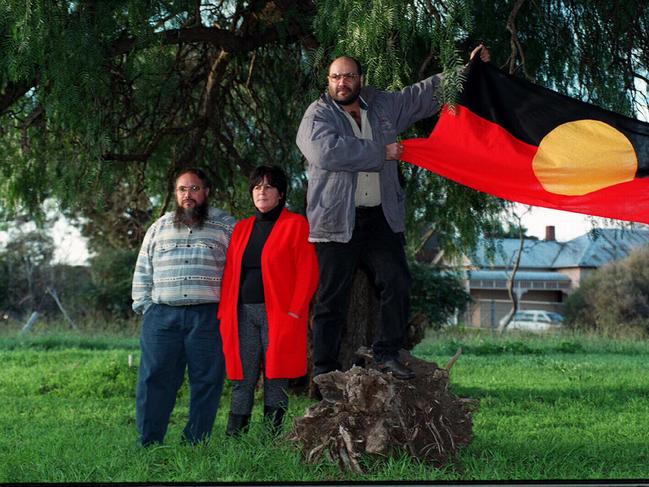
January 1998
Premier Rob Borbidge released figures showing that more than 2300 housing commission homes were under native title claims.
Mr Borbidge used the figures to back up his claim that “backyards’’ were under threat from native title.
A table prepared by the Housing Department details affected housing commission properties in Charleville, Roma, Gladstone, Mt Morgan, Cloncurry, Rockhampton and Mt Isa.
Some of the claims are for all land, waterways, air resources, flora and fauna, excepting only private freehold.
August 1999
A massive $800 million central Queensland nickel mine given the green light was a native title triumph, Premier Peter Beattie said.
Mr Beattie said an agreement between the State Government and Marlborough Nickel shattered claims the project was being jeopardised by bogged-down native title negotiations.
Mr Beattie said the success of the agreement, which included signatures from the Barada, Barna, Kabalbarra, Yetimarla and Darumbal people, quashed criticism of native title laws.
“This is a further demonstration that consultation rather than confrontation works, and is a sound endorsement of the State Government native title regime,’’ Mr Beattie said.

May 2000
Premier Peter Beattie called for all sides to compromise on the native title issue as his crucial state legislation faced defeat in the Senate.
In a letter to the Australian Institute of Geoscientists, Mr Beattie said mining exploration in Queensland had slumped to 10 per cent of what it was because of the state’s inability to grant exploration permits.
He said that before the Wik decision on native title, an average of 400 exploration permits were issued each year in Queensland.
“Last year, 49 exploration permits were granted. Two years ago there were only 20,’’ Mr Beattie said.
May 2001
The Kaurareg people were granted native title over seven islands in the Torres Strait, 79 years after they were first forcibly removed from their land.
The Federal Court determination was reached through comprehensive negotiation between all parties and covers land above the high-water mark on the islands.
Kaurareg tribal elder Billy Wasaga said that the decision had ended a 79-year struggle, begun by his grandfather and others, to have their people recognised as the traditional owners after they were first removed from the island in 1922.
“My grandfather told me, when I was five years old, he say this is not your place … you have to go back to your place,’’ Mr Wasaga said.
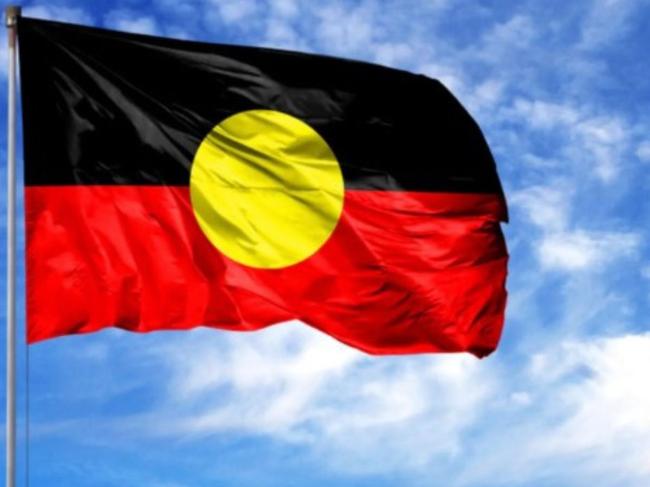
June 2002
Native title over a Queensland pastoral property was extinguished because Indigenous claimants could not afford to challenge it.
Winton pastoralist Noel Kennedy won his case against the State of Queensland to have Castle Hill station, in western Queensland, declared free of native title claims.
Mr Kennedy had been involved in negotiation with the Koa Aboriginal people, but when talks broke down he took the matter to court.
Queensland Indigenous Working Group chairman Terry O’Shane said the Koa people could not fight the issue in court because of insufficient funding.
“This is terrible — it’s an absolute disgrace — and I imagine we’ll now be finding the money to fight it in the High Court,’’ he said.
October 2010
Traditional owners were granted Native Title rights over land in far north Queensland.
The Jirrbal people made three Native Title claims over unallocated Crown land and forest and park reserves around Ravenshoe and Herberton on the Tablelands.
The Federal Court of Australia handed down the consent determinations, with Justice John Dowsett delivering the judgment at Ravenshoe.
The Jirrbal people have exclusive rights over the unallocated Crown land, and have non-exclusive rights over the forest and park reserves.
This means that their rights will be subsidiary to the Queensland Park and Wildlife Service and other interested parties, a Federal Court spokesman said.
The claims were made more than six years earlier.
June 2013
Queensland Indigenous leaders were being stopped from making claims for native title by Indigenous people with little or no established link to a tribe or its land.
Loopholes in Federal Government laws were allowing the elders to be removed from title negotiations in an emerging practice labelled as “claim swapping and tribe hopping’’ by Queensland Labor MP Andrew McNamara.
The laws give some groups a lucrative income for advising the private sector and government agencies on culturally sensitive sites.
In one case, respected Indigenous leader Marie Wilkinson, 74, was among several elders ejected from the Butchulla people’s claim to land around Hervey Bay and Fraser Island.
Ms Wilkinson said she was disgusted at being removed from her own tribe’s claim which she had worked on for more than a decade.
March 2015
An Indigenous group launched unprecedented legal action to stop Queensland’s largest mining project – the $16 billion Adani megamine in the Galilee Basin.
The native title claimants, the Wangan and Jagalingou people, rejected Adani’s attempts to get an Indigenous land use agreement, saying the country is sacred.
The refusal pushed the case back into the Native Title Tribunal for a determination but it also became confused by competing native title claims.
Political lobbyists were also involved, including ginger groups The Sunrise Project, Get Up! and Lock The Gate.
November 2019
Residents on Moreton Island – the third-largest sand island in the world – were on tenterhooks ahead of the finalisation of a native title agreement tourism operators feared could cruel their business and limit access to popular sites.
Petrie MP Luke Howarth slammed the State Government for a lack of consultation, including speculation that 120ha of land will be returned to traditional owners.
It meant the traditional owners could become the landlord of the privately owned Tangalooma Resort.
Mr Howarth said locals were worried popular sites on the island such as Blue Lagoon, Cape Moreton Lighthouse, the dunes, boulders and champagne pools could become off limits to visitors.
He said locals, many unwilling to go on the record, were worried about job losses and were critical of the lack of information presented to them.
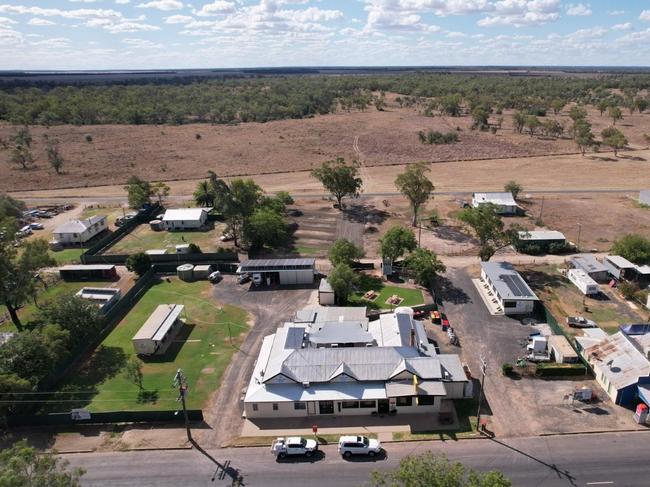
May 2022
Mining giant BHP and the Widi people celebrated a historic Native Title agreement for the South Walker Creek mine and the benefits could last for generations.
The agreement committed to employment, training and contracting opportunities for the Widi people and also improved education outcomes through annual bursary scholarships.
The agreement also included plans for Indigenous land use and cultural heritage management.
The agreement was signed at a ceremony in Nebo, southwest of Mackay.
Widi traditional owner Ken Peters Dodd said it would help the next generation across a range of fronts.
“The main aspect is about the opportunity for our next generation, to be able to secure employment and training and everything in their country and to return back to country,” he said.
September 2023
A major South East Queensland council faced a $210m fight to keep control of thousands of sites including sporting club grounds and popular foreshore parklands as a landmark native title claim headed towards a lengthy court showdown.
Some 3500 sites over 530sq/km of the mainland Redlands were subject to a native title claim by the Quandamooka people in a case that could rewrite national precedent.
First lodged in May 2017 by elders Evelyn Parkin and Uncle Bob Anderson, the Quandamooka Coast claim covers areas including the popular Cleveland and Victoria Point foreshores, sporting club grounds, Redland Performing Arts Centre, council chambers and cemetery.
The Federal Court started considering whether the Indigenous applicants’ connection to country under the native title act exists, with compensation, exclusive and non-exclusive access rights possible compensation.
Such a claim over heavily developed and popular community sites was yet to be tested, and this case could set a precedent for others, a Redland City Council spokesman said.
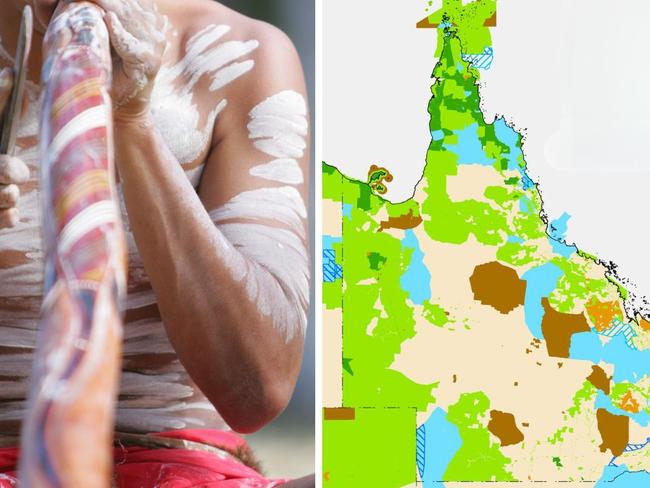
July 2024
Goondiwindi mayor Lawrence Springborg defended a controversial land transfer which would see a town reserve handed over as freehold to an Aboriginal corporation.
It came as the proposed transfer of the 210ha Toobeah Reserve, in the tiny town of Toobeah near Goondiwindi, moved a step closer with Mr Springborg’s council stripped of its 118-year management of the land by the state government.
The Bigambul Native Title Aboriginal Corporation was seeking transfer of the reserve under the Aboriginal Land Act which allows unallocated state land to be given to First Nations groups as “inalienable freehold”.
More than six million hectares of state land – which can’t be sold or mortgaged but is held in trust for the benefit of traditional owners – has so far been granted to Indigenous Australians across Queensland.
Toobeah publican Michael Offerdahl had been campaigning against what he has described as a secretive “Aboriginal land grab”, claiming it will result in 95 per cent of the town and $2m worth of land being given away.
October 2024
The state government refused to release details on a raft of Aboriginal freehold land claims for Queensland towns, blocking access to dozens of documents over fears it could trample First Nations groups’ intellectual property rights and breach dead people’s privacy.
It follows a Right to Information application for documents relating to expressions of interest by Indigenous corporations and groups for freehold transfers of state land across Queensland.
The transfers, made under the Aboriginal Land Act, caused uproar in communities, including Eurong and Happy Valley on K’gari (Fraser Island) and Toobeah near Goondiwindi.
Later that month a Queensland country publican lost his one-man battle to stop his tiny town’s reserve being handed over to an Indigenous corporation as freehold land, but vowed to continue the fight against Aboriginal Land Act transfers happening across the state alongside Pauline Hanson.
The following month fury erupted when it was revealed Yamba Surf Club was being charged to use the beach due to welcome to country services.
September 2025
A North Queensland council confirmed it was no longer doing Welcome to Countries as it started the process to formalise its policy around the traditional practice.
Burdekin Shire Council voted the previous month to develop its own protocol around the traditional practice, but the region’s mayor said the organisation was no longer doing Welcome to Countries.
When asked, Mayor Pierina Dalle Cort said “we don’t have Welcome to Country (here)”.
Welcome to Countries in the Burdekin sparked hot debate late in 2024 after Juru Elder Randall Ross publicly stated the Kyburra Munda Yulga Aboriginal Corporation, which holds the native title over part of the Burdekin and south to Bowen, had voted against continuing the practice on their ancestral land.

Add your comment to this story
To join the conversation, please log in. Don't have an account? Register
Join the conversation, you are commenting as Logout
Stars and scandals: Warts and all history of the Broncos
The Broncos swept into the national rugby league in 1988 and have barely been out of the spotlight since. These are the stories of the superstars and scandals of a NRL giant. SPECIAL REPORT
An almost living organism: What it takes to run Brisbane Airport
The self-described mayor of Brisbane Airport oversees one of Queensland’s most complex operations. WELCOME TO HIGH STEAKS